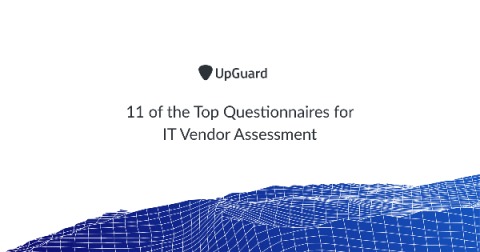Security | Threat Detection | Cyberattacks | DevSecOps | Compliance
Risk Management
Key Steps to Manage Operational Risk
Earlier this week, we shared the Reciprocity response to COVID-19. As the seriousness of this pandemic grows, our thoughts are with all of our employees, customers, and partners who are affected. We want to reiterate that our priority is to uphold our commitment to our customers. We know that many of you are concerned about the impact on your business operations, specifically supply chain issues you might be experiencing or anticipating.
How is COBIT Related to Risk Management?
First released in 1996, Control Objectives for Information and Related Technology (COBIT) is a framework developed by the Information Systems Audit and Control Association (ISACA) that can help you create and implement strategies around IT management and IT governance. The COBIT management framework helps you deal with the risks to enterprise IT and the impacts those risks can have on your company, business processes, and IT systems.
Inherent Risk in the Retail Industry: What You Should Know
The retail industry is undergoing an incredible transformation as emerging technologies, omnichannel shopping, as well as digital and social media, compel organizations to figure out how to operate more efficiently and better accommodate customers. Leaders of companies in the retail industry understand the importance of the digital forces at work in the sector and are looking more closely at the inherent risks these digital forces present.
11 of the Top Questionnaires for IT Vendor Assessment
Business partnerships require trust, but knowing which vendors you can trust to protect your customer's PII and PHI is difficult. With the rise of information technology, there are countless ways that trust can be broken, whether intentionally or unintentionally. As a starting point, you need additional information about information security policies, internal security practices, incident response and disaster recovery plans, and any past security incidents.
Understanding the Consequences of Failing PCI Compliance
The Payment Card Industry Data Security Standard (PCI DSS) does a great job of outlining how an organization should go about protecting cardholder data. Most organizations take the best practices from the PCI council and implement a strong information security strategy bent on enforcing PCI standards, compliance requirements, and vulnerability management. What happens when an organization doesn’t follow the rules as they should or they suffer a data breach because of negligence?
6 Reasons Why You Need SOC 2 Compliance
System and Organization Controls for Service Organizations 2 (SOC 2) compliance isn’t mandatory. No industry requires a SOC 2 report. Nor is SOC 2 compliance law or regulation. But your service organization ought to consider investing in the technical audit required for a SOC 2 report. Not only do many companies expect SOC 2 compliance from their service providers, but having a SOC 2 report attesting to compliance confers added benefits, as well.
How to Communicate Risk: Profiles, Dashboards and Responsibilities
The risk of a data breach with significant financial consequences and damage to brand equity is the fear of most large publicly traded companies. But many smaller businesses wrongly assume they are too small to be on the radar of the threat actors. The truth is that it is all about the data, and small businesses often have less well-guarded and well-defined structures for their data stores.
The Best Ways to Maintain PCI Compliance
Congratulations, you have achieved PCI compliance! Now comes the hard part, staying compliant. Remember, it was a great deal of work to get your environment where it needed to be for the Payment Card Industry Data Security Standard (PCI DSS). Organizations spend a fair amount of money getting systems, networks, and people exactly where they need to be for cardholder data protection.






